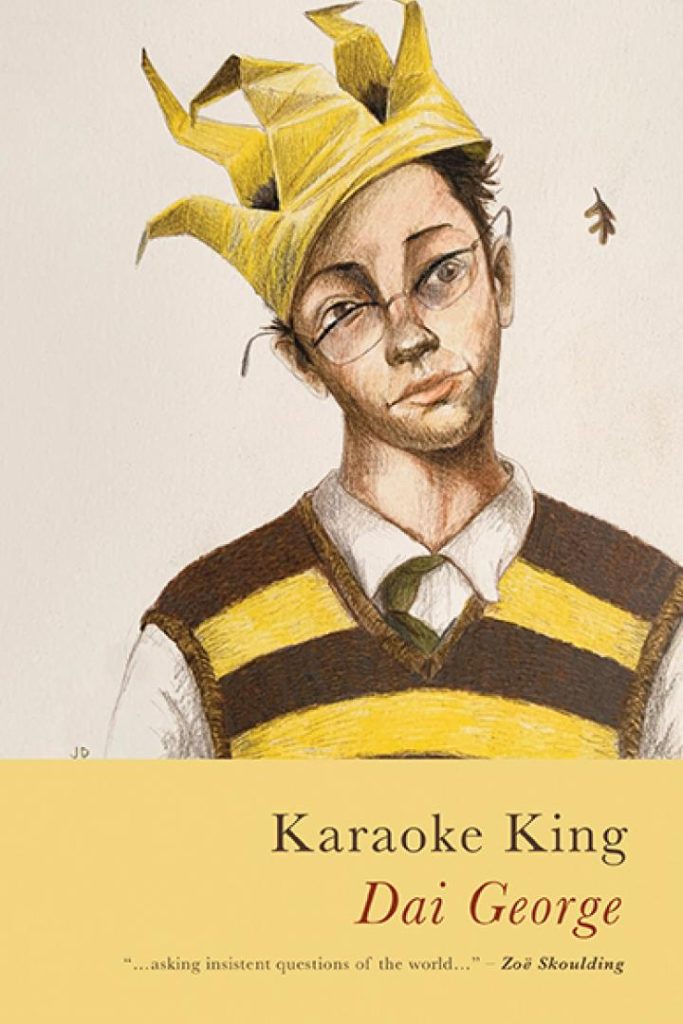Karaoke King
Dai George
(Seren Books, 2021); pbk £9.99
Intricately lyrical, Dai George’s second collection Karaoke King is infused with musicality and rhythm. Through styles ranging from reggae to calypso to jingles, this deft fusion of themes and contemplations explores concerns surrounding politics and climate change, and trepidation in approaching an increasingly digitalised world. Within this poetic medley are strains of uncertainty and unpredictability; the tempo is always shifting, never fixing us to one sense of place or time for long—his diverse musicality and thematic exploration makes us feel like we’re everywhere at once, in ‘a home not rooted now.’
A glance at the front cover shows a man in formal attire that has become dishevelled, supplemented by wonky glasses in front of a glazed expression contemplating a single leaf of nature amidst blank space, which suggests a skewed, distorted lens perhaps. Portraying the man in this vulnerable state, the poet hints at the current human condition as one that is drunken and disillusioned—a fractured reality that has lost all structure and meaning, a destructive system of our own making, rather than a natural, fulfilling environment.
The titular poem ‘Karaoke King’ describes the narrator’s voice as a ‘mewl of a cat’ in an ‘empty bar,’ displaying an intoxicated confidence:
Lovingly I swing the mic, an anxiety under
the influence[.]
The precise enjambment creates an undeniable sense of loneliness and heaviness of mood, belied by the enthusiastic sense of rhythm in the face of social isolation: ‘she’s stirring and I sense the swelling; the toxic male / voice pageant blossoms in the wings.’ Youthful hope is challenged throughout his collection, particularly in ‘Party Time’:
the Bildungsroman flops
exhausted, on the other side of innocence[.]
As the narrator matures, this rhythmic vitality slows down, having chased dreams that led to unsatisfying conclusions. Trapped between generations, the distorted memories of youth are recalled with a profound lyricism; his social group is described as ‘what a mash-up. What a bam-bam. We’re a type of / coded euphemism that both flatters and offends.’ However, what is most impressive is the collection’s knack of centring this music motif within corrupt politics and fractured histories, as shown through the stanza break:
History entrenches like a garrison around the speaker,
and never with its lines straight, or its ethics.
No matter what age, the narrator is always faced with corrupt social systems and moral complications. In ‘Aisles,’ his teenage self spends ‘empty schoolnights’ at the supermarket in a state of ‘enchanted boredom.’ A young student eagerly enters the big wide world, only to be bitterly exposed to materialism and mass consumerism:
I lied when I said I never
wonder how it happens; how
like a quietly ovulating mammal
these shelves replenish
[…]
It stuns me into apathy
the colour and thin consistency
of milk expressed and pasteurised
by exploited farmers.
The collection’s lexical precision and perfectly timed enjambment allows the feeling of always reaching out, then being reeled straight back in. These students are disillusioned by the systems that raised them—they are exposed to reality, yet unable to change it. Further anxieties surrounding climate change are seamlessly linked into the following poem ‘Poem on 27th Birthday,’ where
Today is a first bite of a well-hung steak,
the middle third commencing in a long life’s
lunch.
Life itself is depicted as food to be mindlessly eaten—but unlike the ‘ovulating’ shelves in ‘Aisles,’ we cannot endlessly extend our own shelf-life. Grimly observing that ‘today’s been flashed on the griddle and served,’ and that ‘grief baked heavy in my attic room’ in ‘Know It, Scratch,’ the poem warns us of the ultimate consequence of consumer culture: that we will ultimately become consumed ourselves.
Fractured across place and time, Karaoke King provides a mixtape of disenchanted dreams and bitter realities. However, persistent rhythmic experiments inject a much-needed vitality—it might not be the world the collection hopes for, but it’s the rhythm of life, nonetheless.
Orla Davey


Leave a Reply